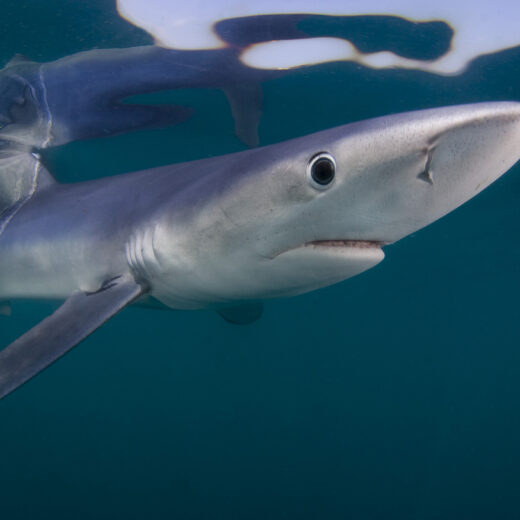
![]()
![]()
By Saeed Kamali Dehghan
A rising demand for shark fin soup is wiping out more than 73 million sharks every year, fuelling a practice labelled the marine “gold rush”.
Finning, when a shark’s fin is sliced off while at sea and the body dumped back into the ocean, is rampant in many regions – fins are one of the most expensive seafood items, ending up mostly in soup. The delicacy had been particularly popular in China but a nationwide conservation campaign saw consumption drop 80% since 2011.
However, demand is still huge in Hong Kong, Taiwan and Macau, and growing in other parts of Asia, such as Thailand, Vietnam and Indonesia, according to conservation organisation WildAid.
In the UK, where shark finning is banned – as it is in all EU states – the soup is still on the menu in as many as a dozen restaurants, although many others have now stopped serving it, according to the charity Bite-Back Shark and Marine Conservation. The dish can cost up to £180 a bowl.
People ordering the soup in the UK are likely to be consuming endangered species, said Graham Buckingham, Bite-Back’s campaign director. International trading agreements governed by the World Trade Organization allow a fin trade in most countries.
“It is perfectly legal for any adult travelling to Europe to bring 20kg of shark fins as part of their personal import allowance,” he said.
“People caught bringing meat or cheese into Europe would have that seized and destroyed. However, somehow, 20kg of shark fins is OK. It’s enough to make 705 bowls of soup and would be worth around £3,500 on the black market.”
Shark finning has been banned in European vessels and waters since 2003. EU regulation was tightened in 2013 to require “all EU vessels to land sharks with their fins still naturally attached to the carcass”, according to Ali Hood, director of conservation at the Plymouth-based Shark Trust.
But a shark fin ban is something different, she said. “This represents a ban on the trade of a product within a country – something that is not applied in the UK or EU. Hence, fins from certain sharks can be legally traded and sold to the public for consumption.
“Confidence that fins that are seen for sale come from managed fisheries and not protected species is the challenge – traceability is essential, and there are those who feel that a ban on all shark fins is the answer. However, simply banning fins doesn’t necessarily curb shark mortality.”
More than a quarter of the world’s shark species are threatened with extinction, according to the International Union for Conservation of Nature. After finning, sharks are often alive as they are discarded overboard to die of suffocation, bleeding or being eaten by other predators.
Although shark finning is rife in many regions, Pacific islands including Papua New Guinea, Solomon Islands and Tuvalu have succeeded in almost eradicating it – a success story in an otherwise dark global picture. New data from the Marine Stewardship Council shows shark finning has significantly declined among the island states of the Parties to the Nauru Agreement.
Indonesia is one of the world’s largest producers of shark fins. In Hong Kong, which accounts for 40% of global shark fin trade, imports remain anecdotally “quite high”, although official figures show declining trends in recent years.
Last September Hong Kong’s largest restaurant chain, Maxim’s, under pressure from campaigners, announced that shark fins would be banned from all its outlets from January 2020.
Susan Millward, marine animal programme director at the US-based Animal Welfare Institute, said rising demand puts sharks at risk. “Their slow reproductive rates make them extremely vulnerable to extinction. The disappearance of sharks – apex predators in many ecosystems – causes dangerous imbalances in marine communities worldwide.”
Shark finning is illegal in US waters, but, according to the Animal Welfare Institute, the country “continues to perpetuate the practice by providing a market for shark fin products”. There are already bans on trading shark fin in 12 states.
Mariah Pfleger, marine scientist at advocacy group Oceana, said a nationwide ban was needed: “Right now, it is impossible to know if a shark fin in the US is a product of finning.
“California has had a ban since 2012, yet government data indicates shark fins are still coming into Los Angeles and being transported through interstate commerce,” she said.
“Even as companies and states close the door on the shark fin trade, other doors remain open, and the market shifts accordingly. After California and Illinois enacted their bans, shark fin trade activity shifted primarily to Texas. Once Texas implemented its own shark fin trade ban, trade in shark fins moved to Georgia. A federal ban will eliminate this game of whack-a-mole.”
Stay in touch and get the latest WildAid updates.
SIGN UPAbout WildAid
WildAid is a non-profit organization with a mission to protect wildlife from illegal trade and other imminent threats. While most wildlife conservation groups focus on protecting animals from poaching, WildAid primarily works to reduce global consumption of wildlife products such as elephant ivory, rhino horn and shark fin soup. With an unrivaled portfolio of celebrity ambassadors and a global network of media partners, WildAid leverages more than $308 million in annual pro-bono media support with a simple message: When the Buying Stops, the Killing Can Too.
Journalists on deadline may email communications@wildaid.org


